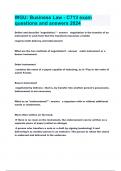Exam (elaborations)
WGU: Business Law - C713 exam questions and answers 2024
- Course
- Institution
Define and describe "negotiation." negotiation is the transfer of an instrument in such form that the transferee becomes a holder requires both delivery and indorsement What are the two methods of negotiation? order instrument or a bearer instrument. Order Instrument contains the name...
[Show more]



